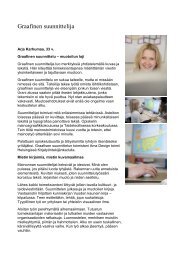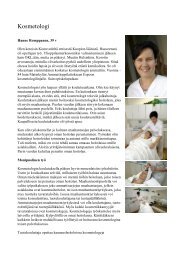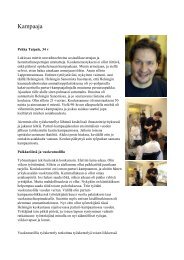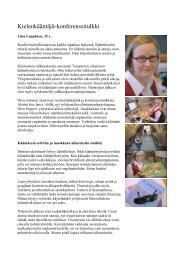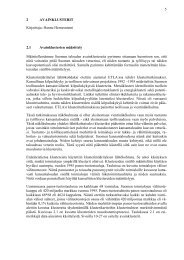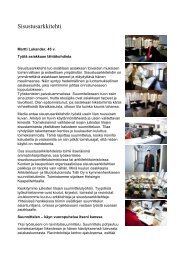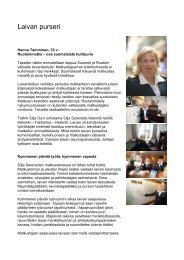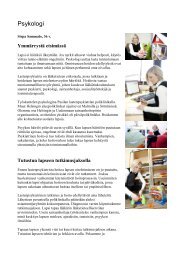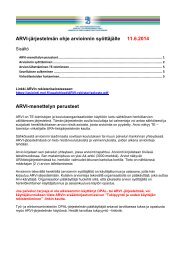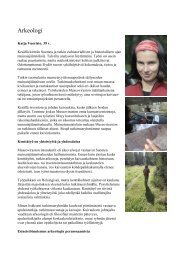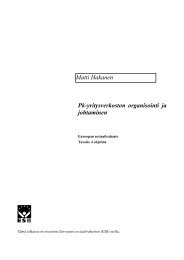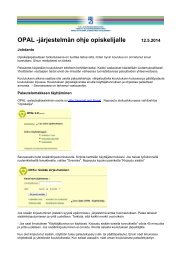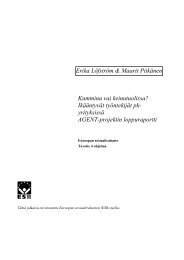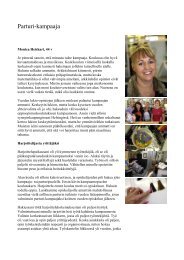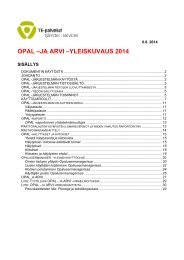Working Life Barometer in the Baltic Countries 2002 (pdf) - mol.fi
Working Life Barometer in the Baltic Countries 2002 (pdf) - mol.fi
Working Life Barometer in the Baltic Countries 2002 (pdf) - mol.fi
Create successful ePaper yourself
Turn your PDF publications into a flip-book with our unique Google optimized e-Paper software.
20<br />
proceed<strong>in</strong>g from its economic opportunities to persons whose <strong>in</strong>come is<br />
lower than <strong>the</strong> of<strong>fi</strong>cial poverty l<strong>in</strong>e. In recent years <strong>the</strong> amount of social<br />
security bene<strong>fi</strong>ts paid has been on average 300 million kroons per year. The<br />
need for social security bene<strong>fi</strong>ts differs greatly by regions, depend<strong>in</strong>g directly<br />
on <strong>the</strong> level of unemployment and be<strong>in</strong>g thus <strong>the</strong> highest <strong>in</strong> <strong>the</strong> regions with<br />
<strong>the</strong> highest unemployment (Võrumaa, Ida-Virumaa) and <strong>the</strong> lowest <strong>in</strong><br />
Harjumaa. Of all households receiv<strong>in</strong>g social security bene<strong>fi</strong>ts households<br />
with an unemployed member make up 55%. Over half of <strong>the</strong> households<br />
receiv<strong>in</strong>g bene<strong>fi</strong>ts have children. Thus, unemployment is <strong>the</strong> most important<br />
poverty risk. However, it seems that <strong>the</strong> so-called subjective poverty is<br />
generally decl<strong>in</strong><strong>in</strong>g <strong>in</strong> Estonia. The proportion of those persons who consider<br />
<strong>the</strong>ir <strong>in</strong>comes quite <strong>in</strong>suf<strong>fi</strong>cient is decreas<strong>in</strong>g and that of <strong>the</strong> persons who<br />
consider <strong>the</strong>ir <strong>in</strong>comes suf<strong>fi</strong>cient is <strong>in</strong>creas<strong>in</strong>g.<br />
EDUCATION<br />
The structure of <strong>the</strong> educational system <strong>in</strong> Estonia was recently modi<strong>fi</strong>ed,<br />
especially at <strong>the</strong> secondary level, to br<strong>in</strong>g it closer to <strong>the</strong> educational systems<br />
of developed countries and harmonise it with <strong>the</strong> Bologna Declaration.<br />
Children start school at <strong>the</strong> age of 7, and it takes n<strong>in</strong>e years to complete<br />
compulsory primary education. General secondary education is acquired at<br />
gymnasiums <strong>in</strong> three years. As a consequence of <strong>the</strong> reform of vocational<br />
education, s<strong>in</strong>ce <strong>the</strong> academic year 1999/2000 it is possible to cont<strong>in</strong>ue studies<br />
to obta<strong>in</strong> a secondary vocational education after complet<strong>in</strong>g primary education<br />
(3 years at vocational schools) or after secondary school (2 years). As to<br />
higher education, professional higher education can be acquired at<br />
professional higher schools <strong>in</strong> 3 to 4 years and academic higher education at<br />
universities. The <strong>fi</strong>rst level of academic higher education is bachelor's studies<br />
(3 years), which is followed by master's (2 years) and doctoral studies (4<br />
years). Until <strong>2002</strong> bachelor's programmes <strong>in</strong> Estonia were meant for 4 years.<br />
S<strong>in</strong>ce <strong>the</strong> academic year <strong>2002</strong>/2003 new bachelor and master programmes<br />
were launched based an an <strong>in</strong>tegrated 3+2-year system.<br />
Estonia has jo<strong>in</strong>ed <strong>the</strong> Bologna and Sorbonne declarations, which create a<br />
uniform educational space <strong>in</strong> Europe, <strong>the</strong> Lisbon Convention on <strong>the</strong><br />
acknowledgement of higher educational certi<strong>fi</strong>cates and certi<strong>fi</strong>cates enabl<strong>in</strong>g<br />
access to higher education <strong>in</strong> <strong>the</strong> European region and adopted an act on



